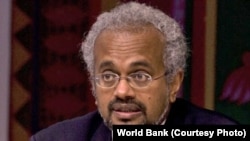JUBA, SOUTH SUDAN —
A leading World Bank economist has urged South Sudan to give local communities a greater say in how funds for development projects are allocated, calling it a vital first step in ending poverty in the fledgling nation.
Shanta Devarajan, the World Bank’s chief economist for Africa, said at a conference in Juba that a study by the global finance group has found that even though African countries are spending more money than in the past on education, health and agriculture, the funds are often mismanaged and do not benefit the communities.
“It is not the amount of money… It is how you spend it. And how you spend it has to have the principle that you spend it in such a way that you empower the poor with that money,” Devarajan said at the conference entitled “Why Countries in Africa and South Asia Are Poor.”
Giving communities a say in how development funds are allocated helps them hold civil servants accountable, which would improve the quality of services provided by civil servants and, in the long run, help South Sudan and Africa as a whole eradicate poverty, he said.
South Sudan’s Minister for Youth and Sports, Cirino Heteng, agreed that including the poor in the decision-making process for allocating funds would help, but added that a lack of oversight was causing the system in South Sudan to fail.
“All these failures of development come because of no supervision,” he said.
“The minister of education, he doesn’t know what his undersecretary is doing; the undersecretary does not know what the schools are doing. They don’t even visit the school. The headmaster is not supervising his teachers because he is not being supervised.”
South Sudan’s economy has struggled to get off the ground since it seceded from Sudan in July 2011.
The main source of revenue for the world’s newest country is oil, but a row with Sudan over fees to transport the crude from South Sudanese oilfields through Sudanese pipelines to seaports led South Sudan to shut down its output of 350,000 barrels a day early last year.
South Sudanese President Salva Kiir has aired doubts as to whether oil revenues would have benefited anyone other than government officials and their associates.Last year he accused some of them of enriching themselves at the expense of the people, stealing some $4 billion and stashing it in foreign banks.
Shanta Devarajan, the World Bank’s chief economist for Africa, said at a conference in Juba that a study by the global finance group has found that even though African countries are spending more money than in the past on education, health and agriculture, the funds are often mismanaged and do not benefit the communities.
“It is not the amount of money… It is how you spend it. And how you spend it has to have the principle that you spend it in such a way that you empower the poor with that money,” Devarajan said at the conference entitled “Why Countries in Africa and South Asia Are Poor.”
Giving communities a say in how development funds are allocated helps them hold civil servants accountable, which would improve the quality of services provided by civil servants and, in the long run, help South Sudan and Africa as a whole eradicate poverty, he said.
South Sudan’s Minister for Youth and Sports, Cirino Heteng, agreed that including the poor in the decision-making process for allocating funds would help, but added that a lack of oversight was causing the system in South Sudan to fail.
“All these failures of development come because of no supervision,” he said.
“The minister of education, he doesn’t know what his undersecretary is doing; the undersecretary does not know what the schools are doing. They don’t even visit the school. The headmaster is not supervising his teachers because he is not being supervised.”
South Sudan’s economy has struggled to get off the ground since it seceded from Sudan in July 2011.
The main source of revenue for the world’s newest country is oil, but a row with Sudan over fees to transport the crude from South Sudanese oilfields through Sudanese pipelines to seaports led South Sudan to shut down its output of 350,000 barrels a day early last year.
South Sudanese President Salva Kiir has aired doubts as to whether oil revenues would have benefited anyone other than government officials and their associates.Last year he accused some of them of enriching themselves at the expense of the people, stealing some $4 billion and stashing it in foreign banks.





